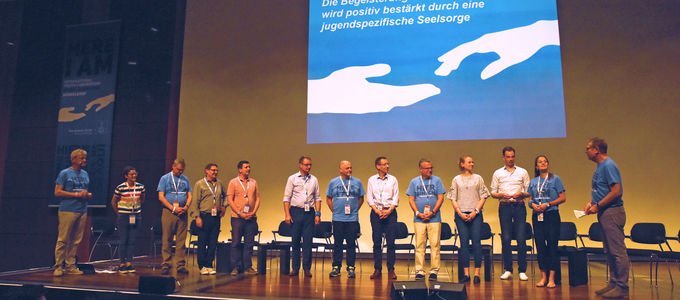
The Apostles wanted to know, how do young New Apostolic Christians want their Church to be? Answers were given during a moderated exchange of ideas and experiences at the International Youth Convention 2019.
The discussions regarding youth-specific topics were held at the Empowerment Center. At a closing round table, participants met with the Apostles to discuss their findings.
Enthusiasm for Christ
The youth defined their enthusiasm for Jesus in concrete terms: by discussing it, sharing their joy, by living Christian values, and being creative in their service to Jesus. As stimulating factors they cited room to manoeuvre, allowing them to participate in the first place, and being heard and perceived as equals in the congregation.
District Apostle Michael Ehrich and Apostle David Heynes responded by pointing out the many opportunities for participation offered by the Church, and encouraged the young people to engage themselves and make suggestions for concrete contributions.
Pastoral care for the youth
The youth felt that pastoral care visits are important because they help to focus on God, and can promote trust between the youth and their youth leaders. Pastoral care is considered a success when it is done with trust and confidence, authenticity, respect, and appreciation. A question addressed to the Church leaders was: how can the Church focus more on the individual personality of the believers?
The Apostles Martin Schnaufer and Thomas Deubel answered that in order to increase the quality of pastoral care, starting in 2020, seminars will be offered also to those who do not bear a ministry.
Participation around the divine service
The participants discussed how divine services for the youth can be made more attractive, and made some suggestions: include a variety of elements, practical sermons that relate to reality and people’s life, and calls-ups that are in harmony with the main sermon. The believers should be actively involved in divine service and be able to contribute their experiences and thoughts. The liturgy should be preserved, however, with more room for the individual congregation to manoeuvre.
The Apostles Jens Lindemann and Ralph Wittich answered that the Church leadership is very open to experiments. Especially in youth services, a number of things can be tried out: readings and accounts of people’s experiences. They asked the youth to give them some more time for such expansions. First the needs of the members have to be determined before a kind of mixture can be introduced, as is already the case with musical contributions. The objective is that everyone is on board.
Congregational life from age 10 to 100
The youth thought about how to improve the way the generations in a congregation live together. It would be helpful to bring the different groups together more often. Young people want to participate and effectively shape their church in a way that suits them. They want the members to be given more responsibility, without them being left alone with it. They advocate for more individual projects that are limited in duration. They made the following suggestion: currently there is too little that can be done by members between the ages of 33 and 59 in a congregation. As soon as very active young people hit this age group they suddenly find themselves facing a certain void.
Unfortunately, there was not enough time during the closing round to discuss these wishes with the Apostles, but these points will definitely be picked up, the moderator of the closing round table promised.
An active contribution within the Church
Finally, the Apostles commented on the looming question: what is being done and what else can be done so that young people can and want to help along in shaping the Church. One of the answers was that young people need projects. Tasks should be limited in time, which will increase their willingness to participate. Participation is also associated with leadership skills. Ministers should engage more in dialogue and not simply say how things are to be done.




